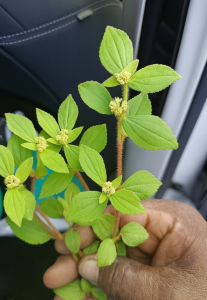Euphorbia Hirta: A Miraculous Herb with Multifaceted Benefits
In the rich world of herbal medicine, where nature offers remedies for countless human ailments, Euphorbia hirta stands out as a potent yet underappreciated miracle plant. Commonly referred to as asthma weed, pill-bearing spurge, or tawa-tawa in the Philippines, Euphorbia hirta is a small, herbaceous plant found in tropical and subtropical regions around the world. Though often overlooked as a roadside weed, this humble herb has been used for centuries in traditional medicine systems such as Ayurveda, Traditional Chinese Medicine (TCM), and Folk Medicine across Asia, Africa, and the Caribbean.
Modern science is beginning to uncover the many pharmacological properties that make Euphorbia hirta so valuable—from antibacterial and antifungal effects to anti-asthmatic, anti-inflammatory, antidiabetic, and even anticancer potential. Let’s take a closer look at this botanical powerhouse and explore its diverse health benefits.
🌿 Identification and Composition
Euphorbia hirta is a hairy, annual plant that grows close to the ground, often found along roadsides, in grasslands, and in disturbed soils. It typically has:
-
Oval or oblong green leaves with serrated edges
-
Fine reddish stems covered in soft hairs
-
Tiny, yellow-green flowers in clusters at the leaf axils
-
A milky sap that exudes when the plant is broken
This plant is chemically rich, containing a wide variety of bioactive compounds, including:
-
Flavonoids (quercetin, rutin)
-
Tannins
-
Alkaloids
-
Terpenoids
-
Polyphenols
-
Saponins
-
Essential oils
-
Phytosterols
These constituents give Euphorbia hirta its wide range of pharmacological effects, making it one of nature’s most versatile herbs.
🌬️ 1. Anti-Asthmatic and Respiratory Support
One of the most traditional and well-documented uses of Euphorbia hirta is for treating asthma, bronchitis, and other respiratory conditions. Its common name, asthma weed, is a direct reference to this effect.
The plant acts as a bronchodilator and expectorant, helping to open the airways and remove mucus from the lungs. Inhalation of its vapors or consumption of a tea made from the leaves is said to ease breathing difficulties, wheezing, and chronic cough.
Its flavonoid content also contributes to its anti-inflammatory effects on the respiratory tract, reducing swelling and soothing irritated lung tissues.
💧 2. Powerful Antiviral and Antibacterial Properties
Euphorbia hirta is gaining popularity in regions like the Philippines and Sri Lanka for its reputed ability to help manage dengue fever, a mosquito-borne viral infection that can cause serious complications like internal bleeding and platelet loss.
Research has shown that Euphorbia hirta has strong antiviral effects, possibly interfering with viral replication. It’s also known to increase platelet count, which is crucial for dengue patients who are at risk of hemorrhage.
In addition, Euphorbia hirta exhibits broad-spectrum antibacterial and antifungal activity, making it helpful for treating infections such as:
-
Diarrhea and dysentery
-
Skin wounds and boils
-
Urinary tract infections
-
Oral and throat infections
💪 3. Anti-Inflammatory and Pain Relief
Euphorbia hirta has shown significant anti-inflammatory properties in various animal studies. The flavonoids and terpenoids in the plant inhibit pro-inflammatory enzymes and pathways, making it effective in the management of:
-
Arthritis
-
Muscle pain
-
Swelling
-
Joint stiffness
-
Post-injury inflammation
Some traditional applications include creating a poultice from the leaves and applying it to swollen or painful areas, helping reduce discomfort naturally.
🍽️ 4. Gastrointestinal and Digestive Health
In many traditional systems, Euphorbia hirta is a go-to herb for treating stomach and digestive complaints. It acts as a carminative (relieves gas), antispasmodic, and antidiarrheal.
Here’s how it supports gut health:
-
Relieves diarrhea and dysentery, especially when caused by infections
-
Soothes stomach cramps and spasms
-
Supports better digestion by stimulating bile flow
-
Improves appetite and reduces bloating
The herb is often steeped into a mild tea and consumed several times a day during digestive distress.
💉 5. Antidiabetic and Blood Sugar Control
Several studies indicate that Euphorbia hirta has potential hypoglycemic (blood sugar-lowering) effects. Extracts of the plant appear to enhance insulin secretion, improve glucose uptake in cells, and reduce oxidative stress—all of which are beneficial for people with type 2 diabetes.
Although more human studies are needed, its use in traditional medicine for managing diabetes symptoms continues to gain attention.
🦠 6. Anticancer and Antioxidant Potential
Early laboratory studies have shown that certain compounds in Euphorbia hirta may exhibit cytotoxic effects—meaning they can inhibit the growth of cancer cells. The flavonoids and tannins in the plant act as antioxidants, neutralizing harmful free radicals that damage cells and contribute to cancer development.
Though these findings are still preliminary, Euphorbia hirta’s antioxidant properties are undeniable and may help:
-
Protect DNA from oxidative damage
-
Support detoxification pathways
-
Slow the aging process
🩹 7. Skin Healing and Wound Care
Thanks to its antibacterial, antifungal, and anti-inflammatory effects, Euphorbia hirta has long been used to treat:
-
Wounds
-
Skin ulcers
-
Eczema
-
Boils
-
Rashes
Topical application of the fresh juice or crushed leaves can help clean wounds, reduce infection, and speed up healing.
🌿 How to Use Euphorbia Hirta
There are many traditional ways to use Euphorbia hirta, depending on the ailment:
-
Infusion or Tea: Boil the dried or fresh leaves in water and drink as a tea for asthma, diarrhea, or dengue support.
-
Poultice: Crush fresh leaves and apply directly to wounds or inflamed areas.
-
Tincture: Alcohol-based extracts can be used for more concentrated internal use (under professional guidance).
-
Capsules or Powders: Available in health stores or herbal pharmacies for convenient daily dosing.
⚠️ Cautions and Side Effects
Despite its many benefits, Euphorbia hirta should be used with care:
-
Toxic in high doses: Overuse may cause nausea, vomiting, or gastrointestinal upset.
-
Avoid during pregnancy or lactation unless advised by a healthcare provider.
-
Not for long-term use without supervision.
-
Consult your doctor before combining it with prescription medications, especially for asthma, diabetes, or blood pressure.
🌿 Final Thoughts: A Botanical Treasure Worth Exploring
Euphorbia hirta may look like a common weed, but its therapeutic value is anything but ordinary. With powerful effects on the respiratory, immune, digestive, and circulatory systems, it serves as a reminder of the profound healing potential found in nature’s simplest plants.
Whether used to manage a cold, recover from dengue, soothe an upset stomach, or boost platelet counts, this miraculous herb continues to earn its place in both ancient traditions and modern research. As interest in natural remedies continues to grow, Euphorbia hirta stands out as a versatile, accessible, and affordable solution for many everyday health challenges.
So the next time you spot this unassuming plant along a trail or roadside, don’t rush to pull it out. You might just be looking at one of nature’s most potent healers. 🌿

